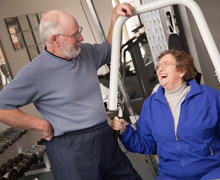
Weight training has been shown to produce many benefits, but it's a practice that is less common among older people. That may change as new research from Brazil shows weight training can improve the mental health of seniors, especially those who suffer from anxiety and depression.
Researchers from the Albert Einstein Jewish-Brazilian Institute of Education and Research conducted a systematic review and meta-analysis of more than 200 articles on the subject and reported their findings in the journal Psychiatry Research.
"Resistance training has been shown to be one of the most effective non-pharmacological strategies for healthy aging," researcher Paolo Cunha said. "It promotes countless health benefits, including improvements to mental health."
Cunha said weight training not only improves the symptoms of anxiety and depression in the general public, but it appears to have a more significant effect on people with a confirmed diagnosis of anxiety or depression.
"Epidemiological studies have shown that the decrease in muscle strength and mass that occurs naturally as we age may be associated with an increase in mental health problems, given the existence of various physiological mechanisms that bring about functional and structural changes and that are controlled by the brain," Cunha said.
Another benefit of weight training for mental health is the social interaction of those involved when the exercising is done in a group setting. Research results gave indications of ways to structure training for the most beneficial mental health outcomes.
"How the training is done appears to influence the results achieved," Cunha said. "The information obtained so far suggests that older people should ideally do weight training exercises three times a week, with three sets of each exercise and sessions that are not too long—six exercises would seem to be sufficient.
"Do less, but do it well: a short set produces better results. This is meaningful information, as we lack guidelines with specific recommendations for resistance training that focuses on mental health parameters."
